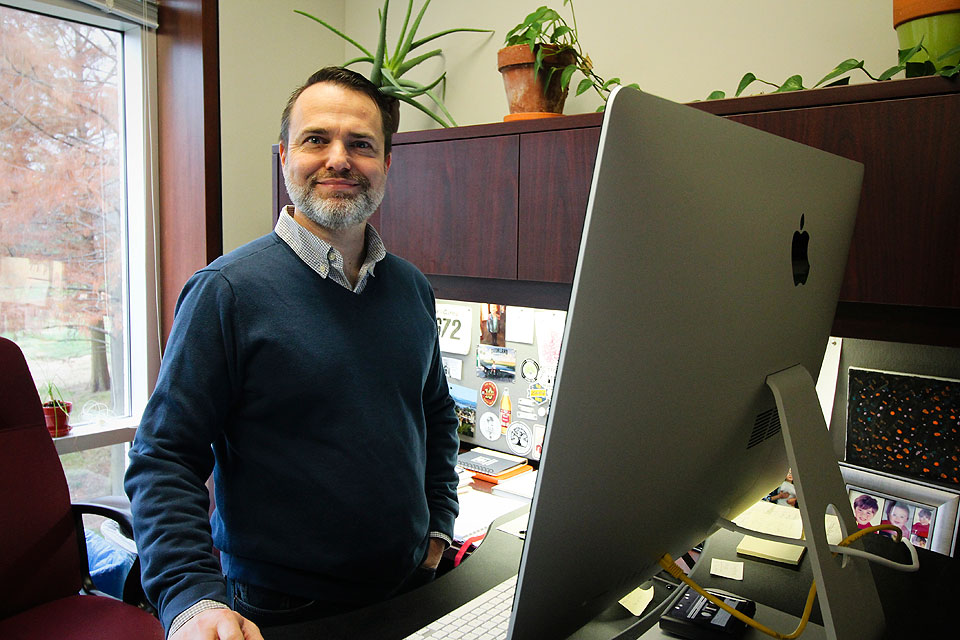Keep Calm and Beat Contagious Stress with Tips from a SLU Stress Researcher
Maybe it's a laptop meltdown just as you're set to turn in your last final. Maybe it’s a case of the holiday blues or homesickness. Or maybe it’s not even your own stress that’s got you down. Regardless of the situation, stress is all around us and like the flu, it can be contagious.
Tips
- Be mindful about “stress-sharing.” It’s always a good idea to seek help and support in stressful times. But not all sharing is a good idea, particularly if others around you may be stressing themselves. Social media and our digital lives can also exacerbate the contagion effect. If necessary, sign off Facebook, tune out the texts and take a break from your social media accounts for a few hours or days so you can get away from the online stress bubble that is only a finger touch or mouse click away.
- Try to change your thinking about a stressful situation. Instead of worrying or brooding about the situation, try to re-think it. Position it as a challenge that you can overcome. Reframing the situation as something you can beat may help you beat stress too.
- Reflect on what’s really at stake in the situation. While some things are important or life-altering, like a death in the family, a financial hardship, or major illness, many every day stressors don’t rise to that level. We imagine they are more important than they truly are. Taking a step back to get some perspective on finals may help you see that things aren’t stressful as they seem.
The Science Behind Your Stress
Saint Louis University researcher Tony Buchanan, Ph.D., knows a lot about stress. It’s what he and students in his lab study every day. Buchanan, an associate professor of psychology and co-director of SLU’s neuroscience program, has made studying stress and its impacts on decision-making and behavior his life’s work. He has conducted studies on the possible links between stress and addictive behaviors including gambling.
Buchanan previously looked at contagious stress – a phenomenon where individuals who aren’t experiencing stress in their own lives seem to catch another person’s stress – in a 2012 paper published in Social Neuroscience. In the paper, Buchanan and his co-authors reported that 20 student research assistants who observed people giving public talks showed elevated levels of cortisol in saliva samples after merely watching the other people give talks. Even though they hadn’t lived through the stress of speaking in public themselves, the student observers displayed a physical reaction to the speakers’ stress.

This group stress contagion, Buchanan explained, is likely a function of how human beings evolved. It is also important to note that stress doesn’t always lead to bad decision-making or addictive behaviors. According to research Buchanan and co-author Stephanie D. Preston, Ph.D., a University of Michigan at Ann Arbor researcher that was published in 2014 by Frontiers in Behavioral Neuroscience, contagious stress can also lead to altruistic behaviors that promote survival and wall-being for individuals and groups.
“If other people can sense stress in you, and can help you with that, that’s good,” he notes. “If they are picking up your stress and getting stressed out themselves, it isn’t always helpful.”
While a person’s individual stress response is contained within his or her own body, observing someone who’s frazzled by deadlines and other problems, large or small, can set off stress responses in friends and family too, he said.
The body’s stress response, when continually triggered by small stressors, from an abrupt email to car trouble, can take its toll physically, emotionally and socially. Research has shown that constantly being stressed out causes trouble sleeping, problems with remembering what assignment is due for which class, stomachaches and long-term health issues like high blood pressure or weight gain. But there are other ways, Buchanan says, to keep yourself from call in the face of contagious stress around you, like incorporating the tips above to help manage stress.
“The stress system is an ancient system that’s there to get us out of danger,” Buchanan explained. “But the system also reacts to a threat like not doing well on an exam the same way it responds to more serious threats.”
Learn More About Buchanan's Other Research on the Good Side of Stress and His New Project
Now, Buchanan and a team of SLU researchers including Enbal Schacham, Ph.D., from the Department of Behavioral Science and Health Education in the College for Public Health and Social Justice, and Michael Goldwasser, Ph.D., from the Department of Computer Science, are working on a new study examining stress physiology and drinking in real time using a smart-phone app and saliva samples to assess the stress hormone cortisol.


















